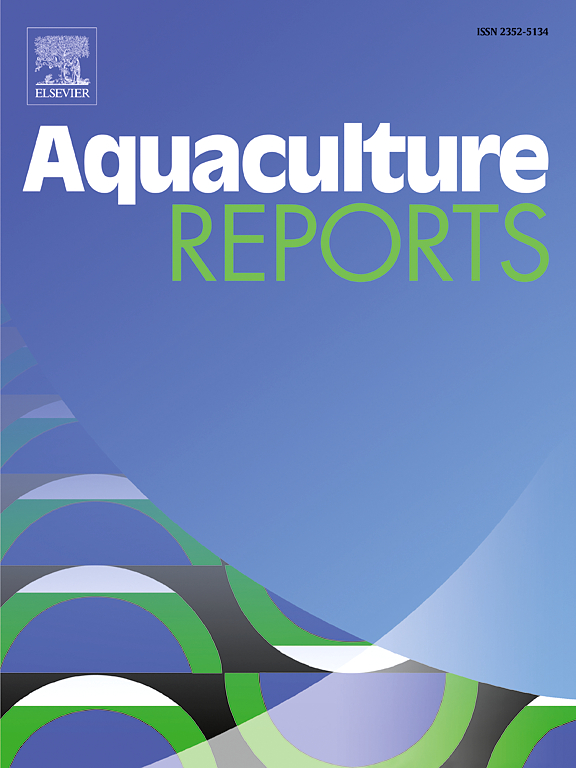Effects of the sulfated polysaccharides dextran sulfate and heparin on shrimp immunity and infection by white spot syndrome virus and Vibrio parahaemolyticus
IF 3.7
2区 农林科学
Q1 FISHERIES
引用次数: 0
Abstract
White spot syndrome virus (WSSV) and Vibrio parahaemolyticus are major pathogens of the economically important shrimp, Litopenaeus vannamei, causing white spot syndrome and hepatopancreatic necrosis disease (AHPND), respectively. In animals, sulfated glycosaminoglycans, particularly heparan sulfate, are key regulators controlling cell communication and infectivity of pathogens. We have tested the hypothesis that dextran sulfate and heparin would afford some protection against white spot syndrome and AHPND. Injection of dextran sulfate (1 % w/v), and heparin (0.3 % w/v) were not toxic, and encouragingly, co-injection of these with WSSV provided some delay in mortality to the shrimp. We then used shrimp feed supplemented with 1 % (w/w) dextran sulfate and 0.1 % (w/w) heparin for 14 days prior to infection by cohabitation with WSSV-infected shrimp or addition of V. parahaemolyticus to tank water. In the absence of pathogen, these feeds altered the shrimp immune response: enhancing PO activity and the expression of Lvpo1, Lvpo2, Lvlyso2, Lvpen3, Lvalf1, and Lvalf2, though no effect on the shrimp microbiome was observed. These activities of dextran sulfate and heparin differed, likely due to their different patterns of sulfated sugars. In the infection challenge, these feeds delayed mortality of the shrimp in WSSV infection, but not with V. parahaemolyticus. The data demonstrate that sulfated polysaccharides can modulate shrimp immunity and prolong the survival of WSSV-infected shrimp. Given there are many natural sulfated polysaccharides of diverse structure, there may be more effective and cheaper food supplements which would go some way to resolving WSSV infections in aquaculture.
硫酸葡聚糖硫酸盐和肝素对对虾免疫及白斑综合征病毒和副溶血性弧菌感染的影响
白斑综合征病毒(WSSV)和副溶血性弧菌是经济上重要的对虾凡纳滨对虾(Litopenaeus vannamei)的主要病原体,分别引起白斑综合征和肝胰腺坏死病(AHPND)。在动物中,磺化糖胺聚糖,特别是硫酸肝素,是控制细胞通讯和病原体传染性的关键调节剂。我们已经测试了硫酸葡聚糖和肝素对白斑综合征和AHPND有一定保护作用的假设。注射硫酸葡聚糖(1 % w/v)和肝素(0.3 % w/v)是无毒的,令人鼓舞的是,它们与WSSV共同注射对虾的死亡有一定的延迟。然后,在与感染wssv的虾同住或在水箱水中添加副溶血性弧菌前的14天,在虾饲料中添加1 % (w/w)硫酸葡聚糖和0.1 % (w/w)肝素。在没有病原体的情况下,这些饲料改变了对虾的免疫反应:提高了PO活性和Lvpo1、Lvpo2、Lvlyso2、Lvpen3、Lvalf1和Lvalf2的表达,但对虾的微生物组没有影响。硫酸葡聚糖和肝素的这些活性不同,可能是由于它们的硫酸化糖的不同模式。在感染挑战中,这些饲料延缓了WSSV感染对虾的死亡,但没有延缓副溶血性弧菌的死亡。结果表明,硫酸酸化多糖可以调节对虾的免疫功能,延长感染wssv对虾的存活时间。鉴于存在许多结构多样的天然硫酸盐多糖,可能会有更有效和更便宜的食品补充剂,在一定程度上解决水产养殖中的WSSV感染。
本文章由计算机程序翻译,如有差异,请以英文原文为准。
求助全文
约1分钟内获得全文
求助全文
来源期刊

Aquaculture Reports
Agricultural and Biological Sciences-Animal Science and Zoology
CiteScore
5.90
自引率
8.10%
发文量
469
审稿时长
77 days
期刊介绍:
Aquaculture Reports will publish original research papers and reviews documenting outstanding science with a regional context and focus, answering the need for high quality information on novel species, systems and regions in emerging areas of aquaculture research and development, such as integrated multi-trophic aquaculture, urban aquaculture, ornamental, unfed aquaculture, offshore aquaculture and others. Papers having industry research as priority and encompassing product development research or current industry practice are encouraged.
 求助内容:
求助内容: 应助结果提醒方式:
应助结果提醒方式:


